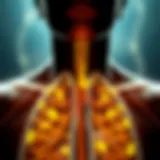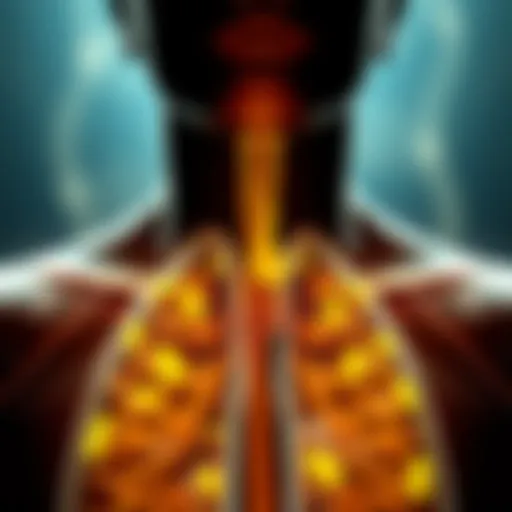Comprehensive Approaches to Cold Sore Management


Key Takeaways
Cold sores, primarily caused by the herpes simplex virus, are a common affliction. Understanding their management is crucial for reducing outbreaks. Here are some essential points:
- Causes and Triggers: Cold sore outbreaks can be triggered by various factors, including stress, fatigue, hormonal changes, and exposure to sunlight.
- Effective Treatments: A combination of antiviral medications like acyclovir and natural remedies can mitigate symptoms and accelerate healing.
- Prevention Strategies: Consistent preventive measures reduce the frequency of outbreaks significantly. These include lifestyle adjustments and topical treatments.
Statistics:
- Approximately 67% of the global population under age 50 is infected with the herpes simplex virus type 1 (HSV-1).
- Once contracted, the virus remains dormant and can reactivate, often without warning.
Practical Tips
To manage cold sores effectively, consider these actionable steps:
Actionable Steps:
- Identify Triggers: Keep a journal to track potential factors causing outbreaks.
- Use Antiviral Medication: Consult with a health professional about using prescription antiviral medications at the first sign of an outbreak.
- Apply Topical Treatments: Creams containing docosanol or lysine can help relieve symptoms.
- Adopt a Healthy Lifestyle: Prioritize sleep, nutrition, and stress management in daily routines.
Suggested Routines:
- Sun Protection: Use lip balm with SPF to protect your lips from sun exposure.
- Hygiene Practices: Wash hands frequently, especially after touching your face or cold sores. Avoid sharing utensils or personal items.
"Managing cold sores involves a combination of medical intervention and lifestyle adaptations. Understanding and implementing these methods can result in significant improvement."
By embracing these strategies, individuals can take control of their cold sore outbreaks and improve their overall well-being.
Understanding Cold Sores
Understanding cold sores is crucial for effective management and treatment. Cold sores, also known as fever blisters, can be a source of significant discomfort and emotional distress for individuals affected by them. The herpes simplex virus is the principal cause, specifically type 1. Identifying and understanding the nature of cold sores provides a foundation for exploring the various treatment options available.
By grasping what triggers these outbreaks, one can take proactive measures to minimize occurrences, effectively reducing their impact on daily life. Knowledge about cold sores facilitates better choices in terms of medical and natural remedies, enabling individuals to manage outbreaks effectively and improve their quality of life.
Defining Cold Sores
Cold sores are small, fluid-filled blisters that typically appear around the lips or mouth. They are caused by the herpes simplex virus, leading to recurrent outbreaks. The lesions often break open, ooze, and then form a crust during the healing process. Patients often experience itching, burning, or tingling sensations before the blisters surface. Understanding this definition is vital, as it establishes the physical manifestation of the condition and its recurring nature.
Causes and Contributors
Herpes Simplex Virus Type
Herpes Simplex Virus Type 1 (HSV-1) is the primary cause of cold sores. This virus is highly contagious and often spreads through close contact, such as kissing. Once contracted, the virus remains dormant in nerve cells and can be reactivated under certain conditions. An important characteristic of HSV-1 is its ability to lead to recurrent outbreaks, which can be triggered by various factors.
The key benefit of discussing HSV-1 is its infectious nature, emphasizing the need for awareness around hygiene and transmission. Understanding the lifecycle of this virus equips individuals with the insight necessary to anticipate outbreaks.
Triggers and Risk Factors
Triggers and risk factors play a significant role in the frequency and severity of cold sore outbreaks. Stress, fatigue, illness, and even sunlight are common contributors. The key characteristic of these triggers is their variability among individuals; what may provoke an outbreak in one person may not affect another. Evaluating triggers provides practical benefits. Knowing personal triggers allows individuals to implement preventive measures. This knowledge can lead to fewer outbreaks and better management practices during symptom onset.
Stages of Cold Sores
Initial Symptoms
The initial symptoms of cold sores often manifest as tingling or itching around the affected area before blisters appear. Recognizing these early signs is vital because prompt treatment can potentially shorten the duration of an outbreak. This early stage stands out due to its subtlety, making awareness crucial for effective management.
Because initial symptoms may appear mild, patients might overlook them, leading to a more pronounced outbreak later.
Blister Formation
Blister formation marks a significant and visible stage in the cold sore lifecycle. It usually occurs within a few days after initial symptoms. The blisters often contain clear fluid and can break easily, which may cause discomfort and increase the risk of spreading the virus. Understanding this stage’s dynamics helps individuals prepare for treatment and care during an outbreak.
The unique challenge during this stage involves managing pain and preventing secondary infections.
Healing Phase
The healing phase follows blister formation, where the fluid-filled lesions begin to crust over and heal. This stage can take several days, and proper care is essential to ensure that the sores heal without complications. Understanding the healing phase is beneficial as it usually involves diminished pain but may still require attention to avoid scabbing or scarring.
This phase highlights the importance of continued care and management techniques to facilitate better recovery.
Recognizing each stage of a cold sore can greatly enhance your ability to manage outbreaks effectively.
Understanding cold sores is foundational for effective intervention. By recognizing definitions, causes, triggers, and stages, individuals can empower themselves with the knowledge to better manage this common condition.


Medical Treatments for Cold Sores
Cold sores can be both uncomfortable and socially challenging. This sections aims to explore the medical treatments available for managing and alleviating these outbreaks. These treatments have a significant role in shortening the duration of cold sores and minimizing the severity of symptoms. Understanding their functionalities can lead to better outcomes for those who experience frequent outbreaks.
Antiviral Medications
Antiviral medications are a cornerstone in the treatment of cold sores. They can disrupt the viral replication cycle, thus reducing the symptoms and healing time. Three main antiviral options include Acyclovir, Valacyclovir, and Famciclovir.
Acyclovir
Acyclovir is a widely known antiviral drug. It works effectively on the herpes simplex virus by inhibiting its ability to replicate. One notable aspect is its rapid action when taken during an outbreak. Acyclovir can be taken orally or applied topically. Its advantage lies in its long-standing history of safety and efficacy.
However, some users may experience side effects such as nausea or diarrhea. Its effectiveness diminishes if taken too late in the outbreak cycle. Still, many consider it a first-line treatment for cold sores, making it a beneficial choice in this article.
Valacyclovir
Valacyclovir represents a newer generation of antiviral medication. It has a higher bioavailability compared to Acyclovir. This means lower doses can achieve similar effects. This characteristic makes it a preferred option for many. It also provides a simple dosing regimen, which can improve patient compliance.
The unique feature of Valacyclovir is its ability to reduce the frequency of outbreaks. But, alongside its benefits, there are potential side effects like headaches and gastrointestinal discomfort. Overall, Valacyclovir stands out as a popular choice in managing cold sores.
Famciclovir
Famciclovir is another antiviral medication that provides effective treatment for cold sores. It functions similarly to Acyclovir but may act more quickly in certain cases. One of its key characteristics is its convenient dosing schedule, which can be set at longer intervals.
Famciclovir can reduce the duration of symptoms effectively. However, some individuals may not respond as well to it compared to Acyclovir or Valacyclovir. So, while it can be a beneficial addition in the arsenal of treatments, user experience may vary, making it essential to evaluate options.
Topical Treatments
Topical treatments offer localized relief and can be an excellent addition to systemic medications. They can target the cold sore directly, providing relief from pain and discomfort. Common options include Docosanol, Zinc Oxide, and various topical anesthetics.
Docosanol
Docosanol is an over-the-counter topical cream that inhibits the fusion between the virus and host cell membranes. This characteristic allows the medication to prevent the spread of the virus. Users often appreciate its effectiveness when applied at the first sign of an outbreak.
Though Docosanol does not eliminate the virus, it can shorten healing time and lessen the size of sores. It is generally well-tolerated. Some people may note a slight burning sensation upon application, but this is often temporary.
Zinc Oxide
Zinc oxide is known for its protective and healing properties. It forms a barrier on the skin that can shield the sore from external irritants. A crucial aspect of Zinc Oxide is its anti-inflammatory benefits. This can contribute to reducing swelling and redness around the sore.
Many patients find Zinc Oxide soothing. It is widely considered safe for topical use without significant side effects. Its unique feature is its versatility, being used in various formulations, including creams and ointments.
Topical Anesthetics
Topical anesthetics provide immediate pain relief for cold sore symptoms. Common anesthetics include lidocaine and benzocaine. These medications numb the area around the cold sore, offering temporary respite from discomfort.
They are particularly useful during the blistering phase. However, while effective for symptomatic relief, these anesthetics do not reduce healing time or prevent outbreaks. Some users might experience allergic reactions, so caution is necessary when applying.
Prescription Creams
Prescription creams can be potent options for managing cold sores. They often contain antiviral properties that can expedite the healing process. Noteworthy examples include Imiquimod and Triclofenac.
Imiquimod
Imiquimod is a topical prescription cream that enhances the immune response against the herpes virus. This unique characteristic makes it a valuable option for treating cold sores. It can reduce the duration of outbreaks if applied correctly during the initial symptoms.
While it may promote faster healing, Imiquimod can cause skin irritation or inflammation in some cases. Therefore, it is essential to follow the prescribed dosage to minimize potential side effects. Its dual function of antiretroviral and immunomodulatory action makes it a beneficial addition to treatment.
Triclofenac
Triclofenac is another prescription cream that falls into the category of non-steroidal anti-inflammatory drugs (NSAIDs). While not a primary treatment for the herpes virus, it provides pain relief and reduces inflammation associated with cold sores.
Its key characteristic is that it can be used alongside other antiviral treatments, making it a supportive option. However, it is typically prescribed for specific cases where pain management is crucial. Some may notice skin reactions, so monitoring is essential during use.


In summary, medical treatments for cold sores provide various avenues for relief, ranging from antiviral medications to topical creams. Understanding the unique features and benefits of each option empowers individuals to make informed decisions in managing their condition.
Natural Remedies and Alternative Treatments
Natural remedies and alternative treatments have gained prominence in the management of cold sores. These approaches appeal to many individuals seeking more holistic or integrative strategies. They often complement traditional medical treatments and can help reduce recurrence and severity of outbreaks. It's crucial for readers to understand that natural remedies may not replace antiviral medications, but can serve as supportive interventions for symptom relief and recovery.
The benefits of using natural remedies include a focus on overall wellness, fewer side effects, and the incorporation of lifestyle changes. However, it is important to consider the individual response to these remedies since effectiveness can vary greatly. Readers should evaluate options and consider consulting with a healthcare professional, especially if they have underlying health concerns.
Lysine Supplements
Lysine is an essential amino acid that the body cannot synthesize, making it necessary to obtain it through diet or supplements. Research indicates that lysine may reduce the frequency of herpes simplex virus outbreaks and lessen healing time. It appears to do this by inhibiting arginine, another amino acid that the virus requires for its replication. People often find lysine supplements beneficial during an active outbreak, or as a preventative measure.
However, potential users should approach lysine with caution. While generally safe, excessive intake can lead to digestive upset or other side effects. It's important to consider dosing according to health guidelines and consult with a healthcare provider before beginning supplementation.
Essential Oils
Essential oils are becoming more popular in the realm of natural treatments for various conditions, including cold sores. They can possess antiviral and anti-inflammatory properties. The two oils often discussed in this context are tea tree oil and peppermint oil.
Tea Tree Oil
Tea tree oil, derived from the Melaleuca alternifolia plant, is well-known for its antiseptic properties. It has a key characteristic of being a potent antibacterial and antifungal agent. This makes it a beneficial choice for dealing with cold sores. Many individuals use it topically to help reduce inflammation and promote healing.
One unique feature of tea tree oil is its ability to target virus-infected cells without causing harm to healthy cells. However, it is necessary to dilute it with a carrier oil to prevent skin irritation. Users should also be aware that some people might experience allergic reactions or skin sensitivities.
Peppermint Oil
Peppermint oil is another essential oil celebrated for its soothing and healing properties. It contains menthol, which is known to provide a cooling sensation and may help relieve discomfort associated with cold sores. Peppermint oil also displays antiviral properties that could potentially assist in fighting against the herpes simplex virus. Its key characteristic lies in its ability to alleviate pain and inflammation.
Despite its many advantages, peppermint oil should be used carefully. Dilution is also essential here to minimize the risk of skin irritation. There’s also a need to test for allergic reactions. Its sensitivity to heat means that it should be stored properly to retain its effectiveness.
Homeopathic Options
Homeopathic treatments have long held an interest for those seeking alternatives to conventional medicine. Some individuals find relief in remedies like Rhus toxicodendron or Apis mellifica. These should be chosen based on specific symptoms experienced during an outbreak. A licensed homeopath can guide the selection process, ensuring a tailored approach to treatment.
While homeopathy may offer some benefits, its effectiveness can be subjective and varies by the individual. Therefore, it is advisable to keep realistic expectations and remain open to combining approaches for best results.
Preventative Measures
Preventative measures play a crucial role in managing cold sores effectively. Recognizing the elements that contribute to outbreaks can help individuals minimize their risk. Implementation of prevention strategies not only reduces the frequency of outbreaks but also lessens the severity when they do occur. Understanding how lifestyle choices, immune health, and personal hygiene impact cold sore occurrences is vital. This section provides detailed insights into practical steps that can be taken to defend against the herpes simplex virus.
Lifestyle Modifications
Stress Management
Stress management is an essential aspect of overall health and plays a significant role in cold sore prevention. High levels of stress can contribute to immune dysfunction, making the body more susceptible to viral outbreaks. Managing stress effectively allows individuals to maintain stronger immune defenses. Common techniques include mindfulness, yoga, and regular physical activity. Each of these methods can improve mood and resilience against triggers. The unique feature of stress management is its holistic approach, promoting not just mental clarity but also physical health benefits. While widely recognized as a beneficial method, it may require time and patience to see significant changes.
Nutrition Considerations
Nutrition considerations also significantly affect the body's ability to deal with viruses. A balanced diet can support immune function, reducing the likelihood of cold sores. Key characteristics include incorporating foods rich in vitamins C and E, zinc, and probiotics. These nutrients enhance the skin's resilience. Eating a diverse range of fruits, vegetables, and whole grains is vital. A well-rounded diet promotes better overall health, which in turn can lower the occurrences of cold sores. One disadvantage may be the challenge of changing dietary habits in the short term, but the long-term benefits are invaluable.
Maintaining Immune Health
Maintaining immune health is pivotal in reducing cold sore outbreaks. The immune system defends against infections; thus, keeping it strong is essential. Regular check-ups, adequate sleep, hydration, and balanced meals all contribute to immune stability. Some individuals may choose supplements, like vitamin D or elderberry, to boost their immune functions. While these can be helpful, they should complement rather than replace healthy lifestyle habits.
Hygiene Practices
Handwashing Techniques
Handwashing techniques are foundational in preventing the spread of the herpes simplex virus. Proper hand hygiene involves washing hands with soap and water for at least 20 seconds, especially after touching the face or any lesions. The key characteristic of effective handwashing is consistency; it must become a habit to be beneficial. This practice minimizes the potential for virus transmission. One unique feature is the accessibility of this preventive measure. It is straightforward and does not require medical intervention. However, individuals may overlook this simple activity, leading to increased risk.
Avoiding Close Contact
Avoiding close contact during outbreaks is essential for containing the virus. This involves steering clear of intimate interactions with others while showing symptoms. This practice is beneficial as it prevents the virus from spreading to those who might be susceptible. The key characteristic is its effectiveness in controlling an outbreak's scope. It can, however, create social challenges, especially during personal relationships. Effective communication with friends or partners during such times may help mitigate misunderstandings. Staying informed and practicing awareness is vital in managing personal health and the health of others.


Managing Outbreaks
Managing outbreaks of cold sores is a critical aspect of dealing with the herpes simplex virus. Each individual experiences different triggers and symptoms. Understanding how to manage these outbreaks effectively can lead to reduced severity of symptoms and shorter healing times. It is essential for patients to know how to recognize the early signs and what options are available for prompt treatment. These strategies not only alleviate discomfort but also empower individuals to take control of their health.
Recognizing Early Symptoms
Recognizing the early symptoms of a cold sore is crucial for effective management. Initial signs may include a tingling or itching sensation around the mouth or on the lips. This pre-emptive stage can last for a few hours to a day before any visible lesions appear.
Other early symptoms can be localized redness and swelling in the area where blisters will form. Sometimes, this is accompanied by a fever or swollen lymph nodes. Being aware of these signs allows one to start treatment early, potentially lessening the duration and intensity of the outbreak.
Expedited Treatment Options
Once early symptoms are recognized, it is beneficial to act quickly. Expedited treatment options can include the use of antiviral medications like Acyclovir or Valacyclovir. These medications may help shorten the outbreak’s length and reduce the severity of symptoms. Over-the-counter topical treatments and ointments can also be applied to soothe lesions during an outbreak, providing immediate relief.
Timely intervention can significantly influence the course of a cold sore outbreak.
In addition, some individuals find immediate relief through natural remedies such as applying peppermint oil or lysine supplements as soon as they feel the first signs. By using a combination of medical and natural options, individuals can tailor their approach to managing outbreaks effectively.
Handling Recurrences
Handling recurrences of cold sores requires both a proactive mindset and strategic preparation. Keeping track of previous outbreaks can help identify specific triggers, such as stress or sunlight exposure. Avoiding known triggers is a proactive step in reducing the frequency of outbreaks.
Furthermore, maintaining overall health through good nutrition, adequate hydration, and regular exercise can strengthen the immune system, which in turn may decrease the likelihood of future outbreaks.
Moreover, developing a personalized cold sore care kit containing antiviral medication, pain relievers, and soothing creams can prepare one for immediate treatment when symptoms arise again.
Being informed and prepared enables one to respond swiftly to the recurrence, making management of cold sores less daunting.
Seeking Professional Guidance
Professional guidance is an essential aspect when dealing with cold sores. The condition can present various challenges that may require expert intervention. Understanding when and how to seek help can significantly influence the management of outbreaks and their complications.
When to Consult a Healthcare Provider
It is advisable to consult a healthcare provider under several circumstances. If cold sores recur frequently or cause severe discomfort, professional insight can be crucial. Moreover, if the lesions fail to heal within two weeks or display signs of infection, such as increased redness or pus, immediate medical attention is warranted. Individuals experiencing persistent pain, fever, or swollen lymph nodes should also consider reaching out to a healthcare professional. Furthermore, people who have underlying health conditions, such as immune deficiencies, should not hesitate to seek guidance. A qualified clinician can help develop a tailored management plan that takes into account individual medical history and needs.
Potential Complications
Cold sores can lead to complications that may have serious implications. It is vital to recognize these risks to facilitate timely intervention.
Secondary Infections
Secondary infections can occur when the skin integrity is compromised. This happens if the cold sore is scratched or irritated, leading to the entry of pathogens. The key characteristic of secondary infections is the potential for increased inflammation and discomfort. This makes it a significant concern in cold sore management. Treating these infections usually requires antibiotics, which may not only prolong healing but also result in further complications, such as antibiotic resistance. Thus, acknowledging the risk of secondary infections is vital for anyone managing cold sores, as preventive measures may be necessary to avert this situation.
Keratitis
Keratitis is another potential complication associated with cold sores, particularly when the virus spreads to the eye. This condition refers to the inflammation of the cornea and can lead to vision loss if untreated. The notable aspect of keratitis is its potential occurrence amidst a cold sore outbreak, especially if there is direct contact with the lesion. Keratitis can become detrimental to eye health, prompting the need for immediate medical assessment. Awareness of this risk is crucial since early detection and treatment can prevent damage. Immediate professional consultation becomes essential when symptoms like pain, blurred vision, or sensitivity to light arise.
"Timely medical advice can alter the trajectory of cold sore management and mitigate health risks."
Understanding the importance of seeking professional guidance can not only alleviate symptoms but also prevents complications in cold sore management. Individualized advice from healthcare providers can enhance overall care and lead to better outcomes.
Culmination
The topic of cold sore management is multifaceted, intertwining various treatments, preventive measures, and lifestyle factors. Understanding cold sores, their causes, and effective management strategies empowers individuals to tackle outbreaks more confidently. In this article, the exploration of medical treatments, natural remedies, and preventive strategies illuminates a path toward better health outcomes for those affected by the herpes simplex virus.
Summarizing Key Points
This article discusses several key elements:
- Medical Treatments: Various antiviral medications such as Acyclovir and Valacyclovir are crucial in managing outbreaks and reducing their severity.
- Natural Remedies: Supplements like Lysine and oils such as Tea Tree Oil provide alternative approaches to soothe symptoms.
- Preventative Measures: Lifestyle modifications, including stress management and hygiene practices, can significantly minimize the frequency of outbreaks.
Additionally, recognizing symptoms early and seeking professional guidance when needed can prevent complications that arise from cold sores. Understanding the complexities around this condition allows for a comprehensive management approach.
Final Thoughts on Management
Managing cold sores requires a strategic blend of medical intervention, natural remedies, and preventive practices. A well-rounded approach not only reduces the frequency and intensity of outbreaks but also enhances overall well-being. Engaging with healthcare providers ensures access to the latest treatments and understanding potential complications, such as secondary infections or keratitis.
The insights provided in this article serve as a foundation for informed decisions regarding cold sore management. Readers are encouraged to tailor their action plans based on personal experiences and professional advice. Ultimately, while cold sores can be distressing, effective management strategies exist that help individuals regain control over their health.







